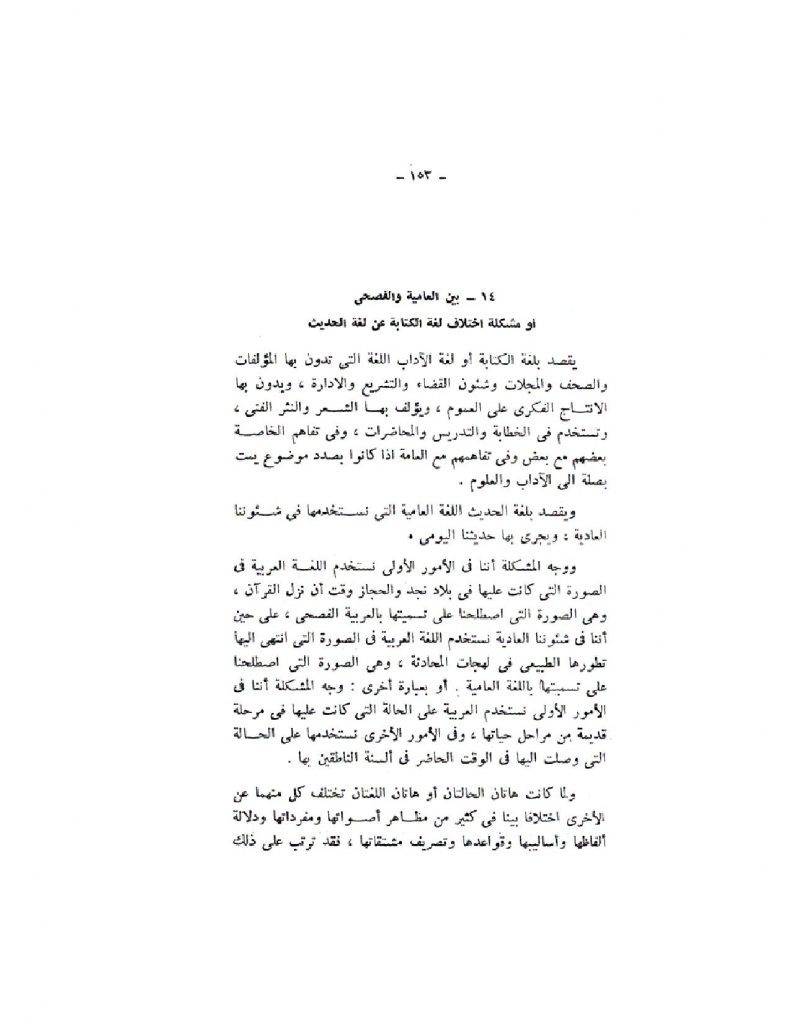
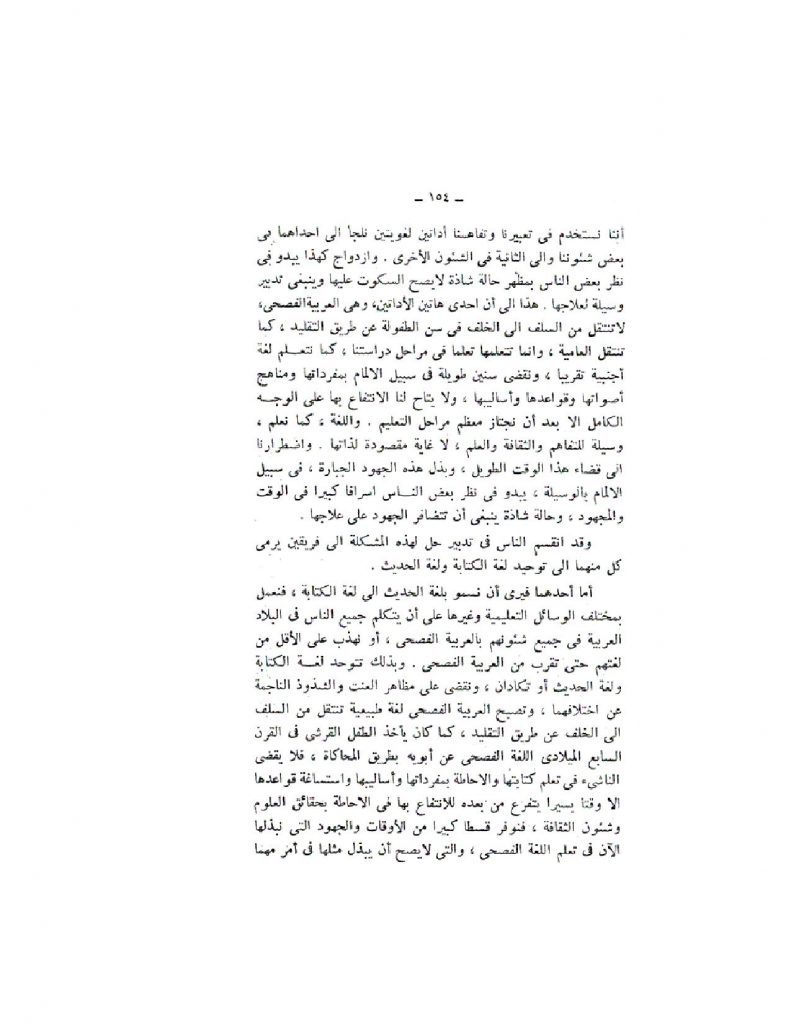
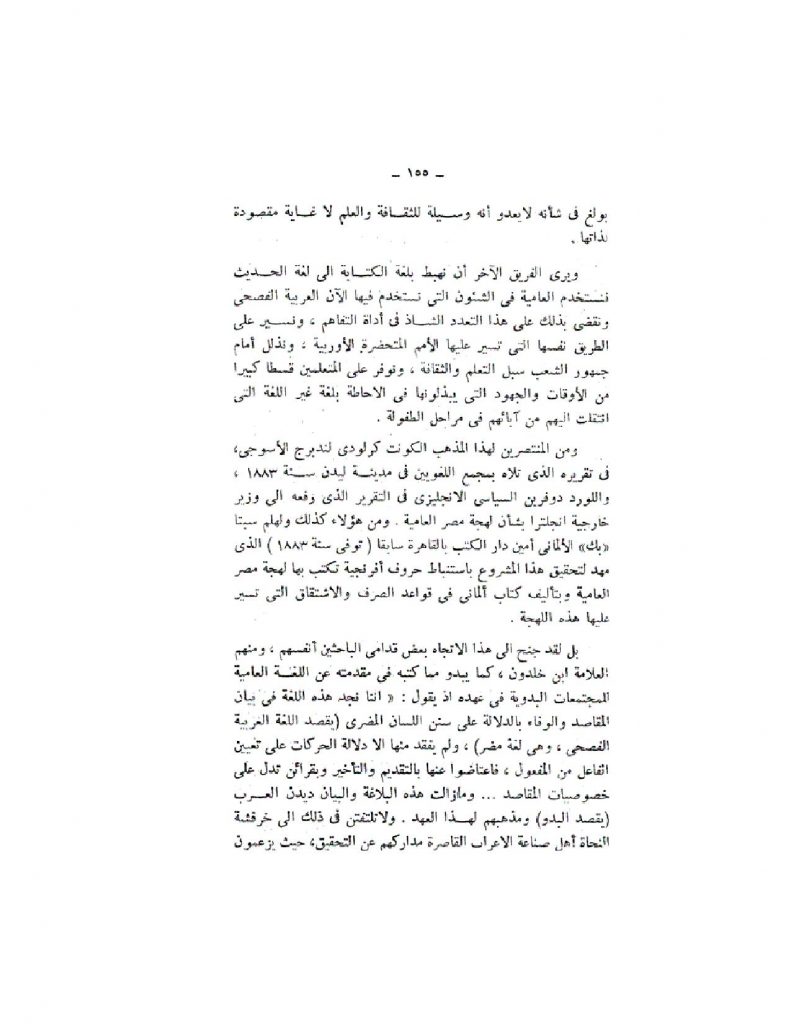
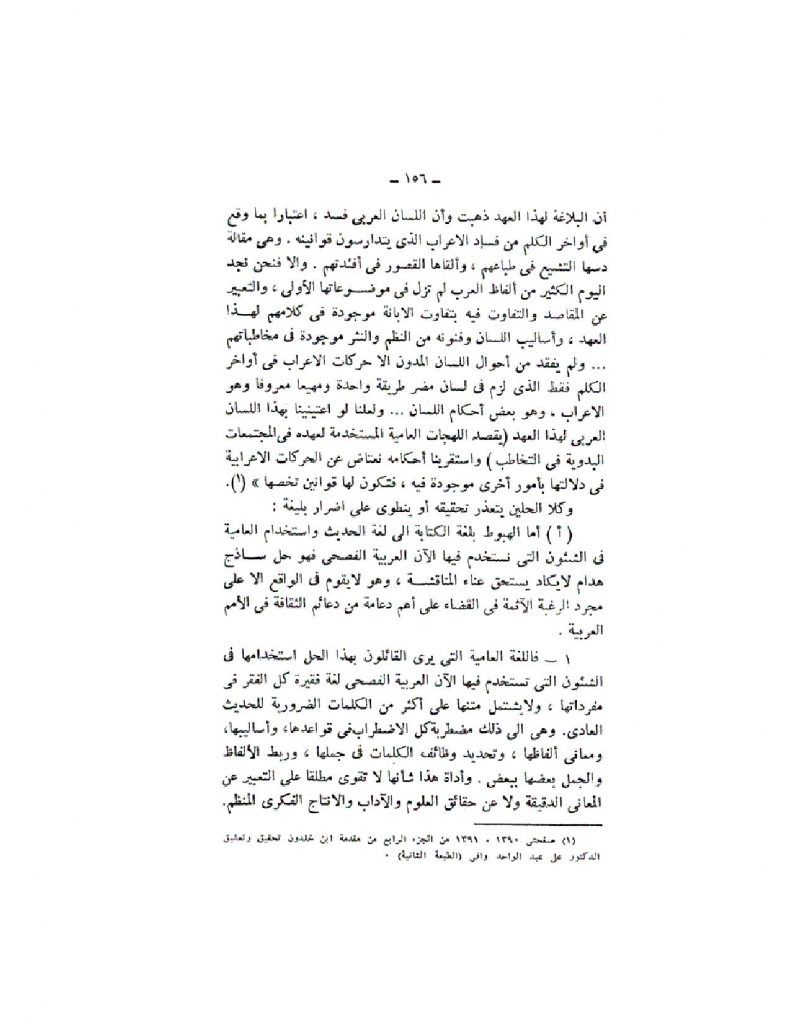
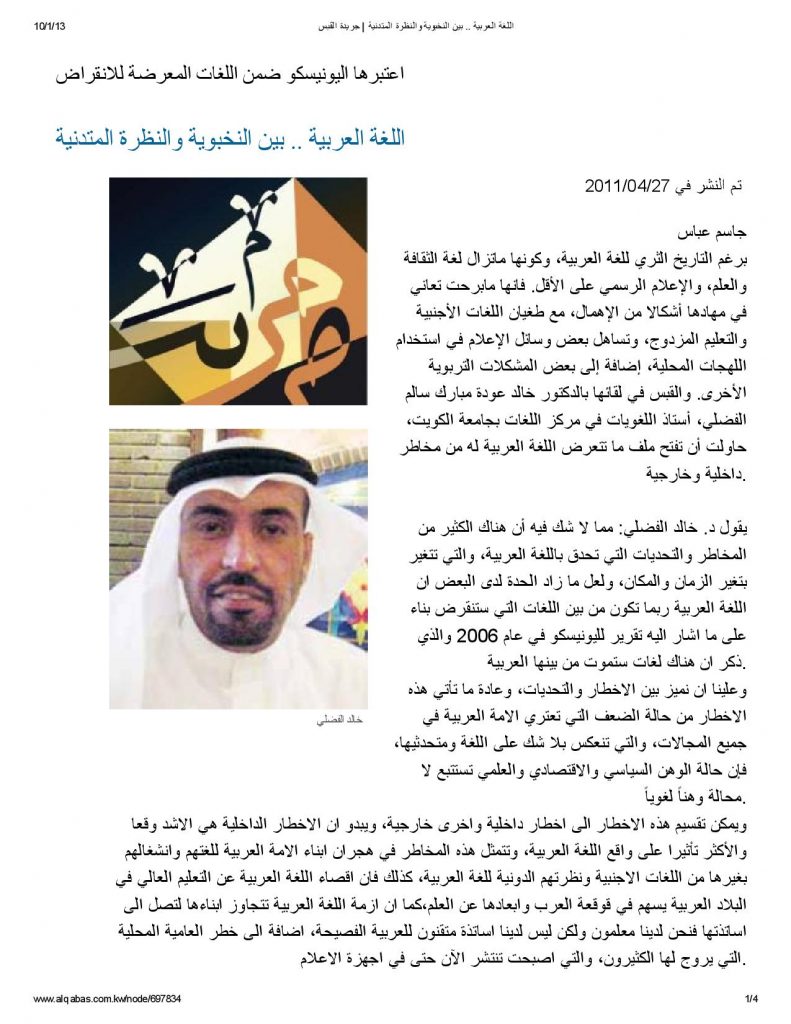
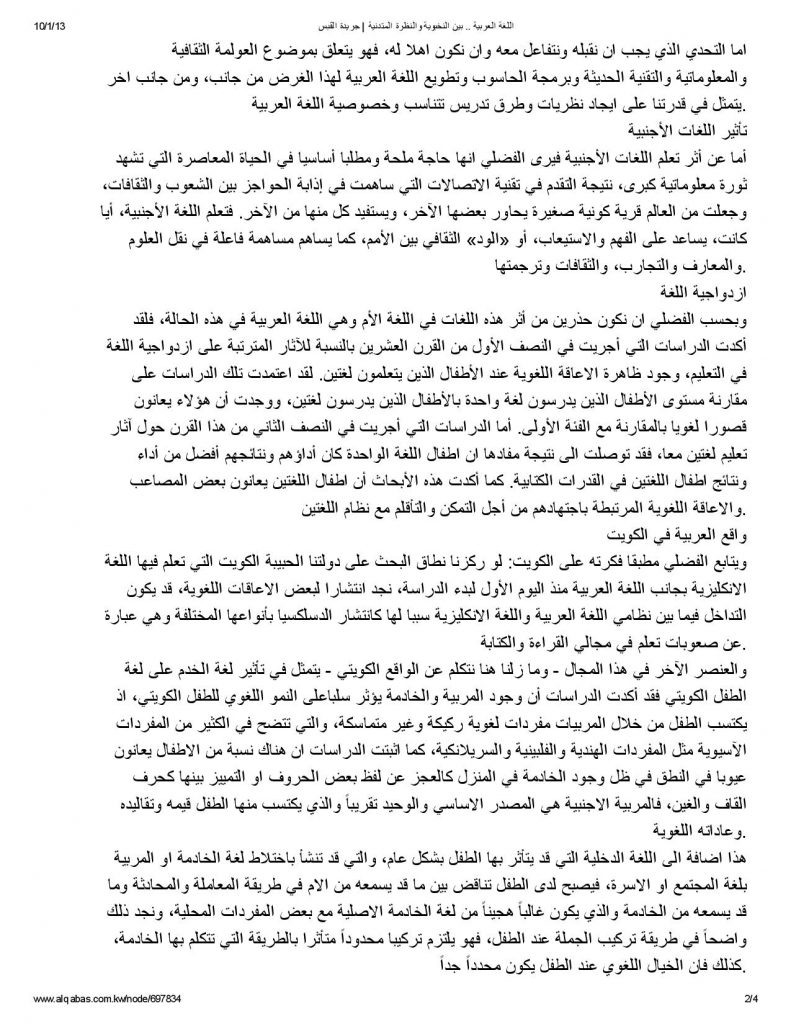
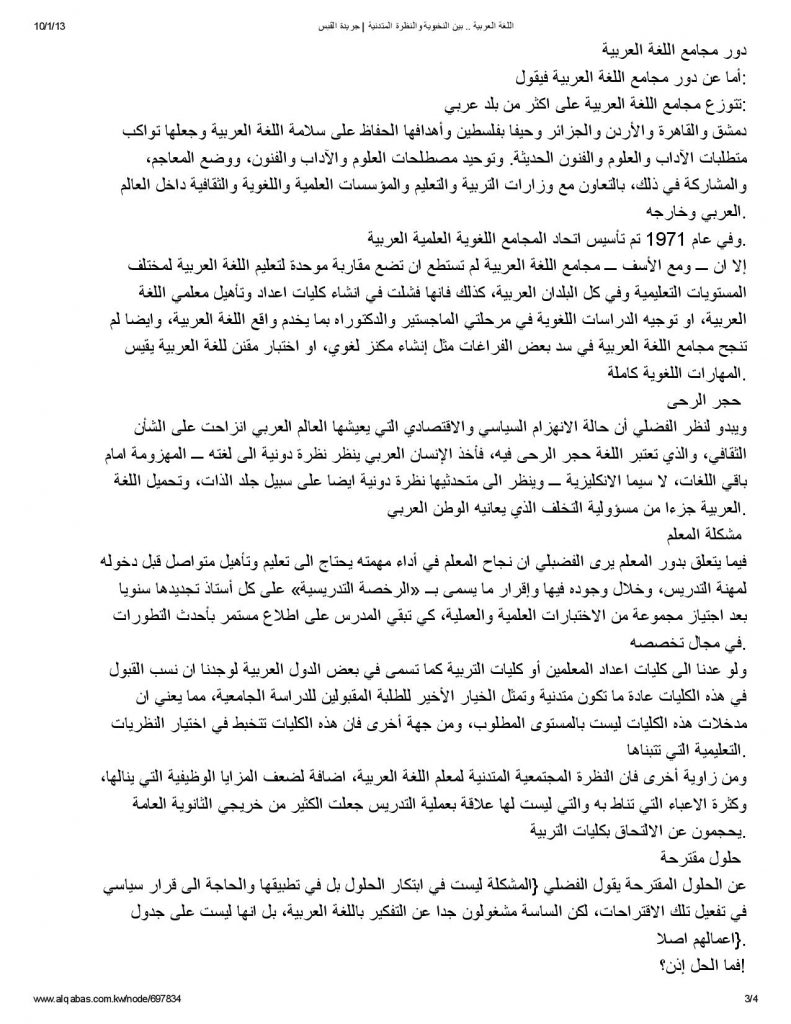

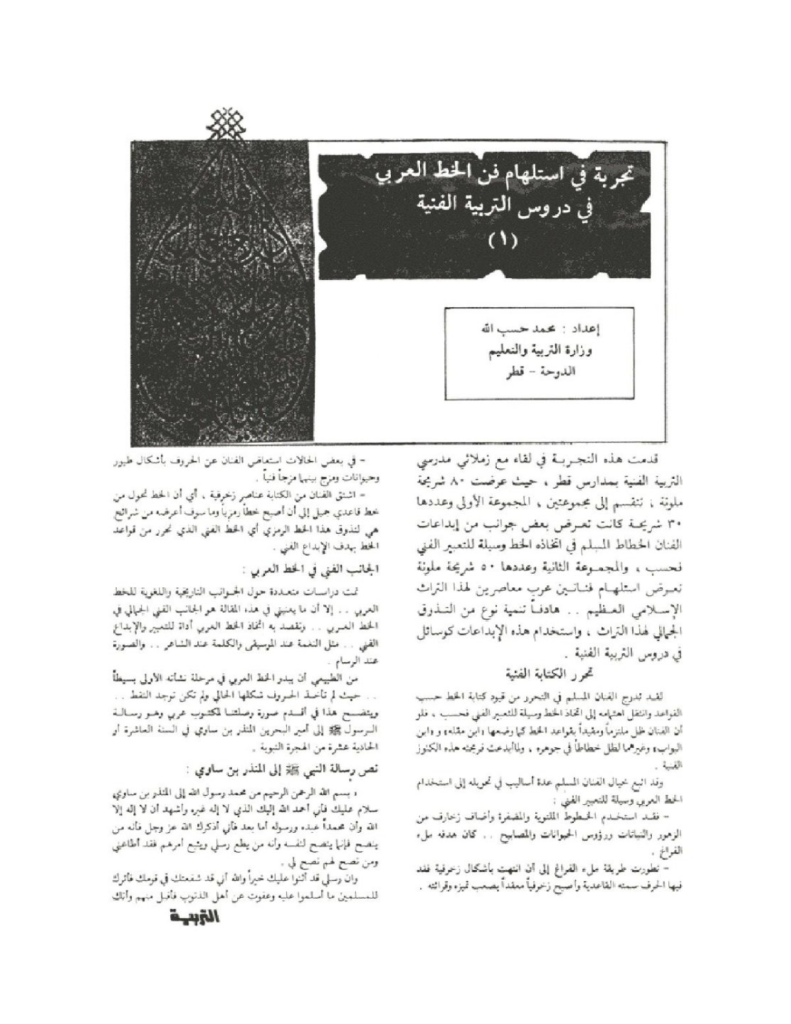
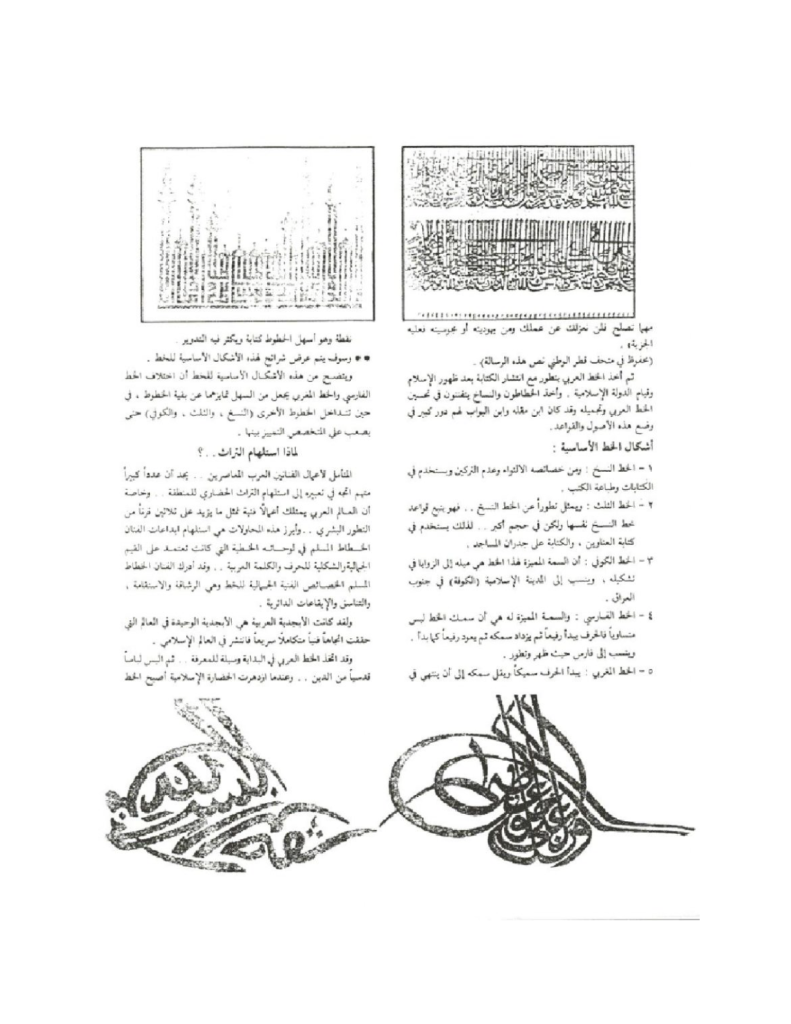
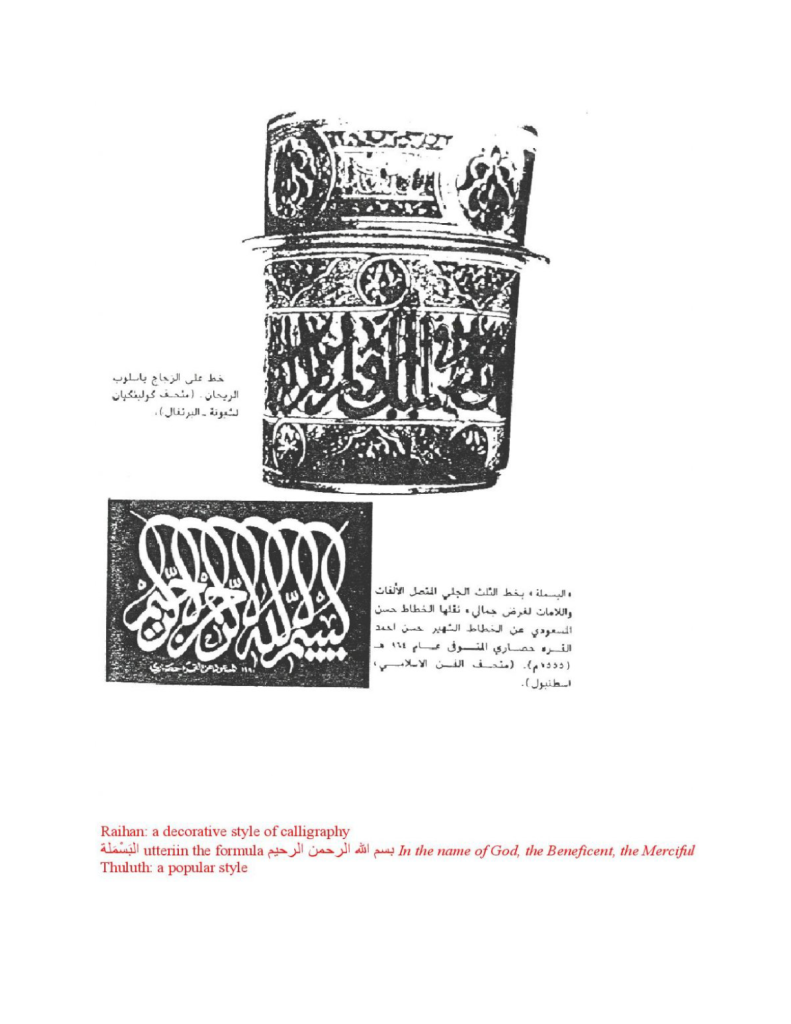

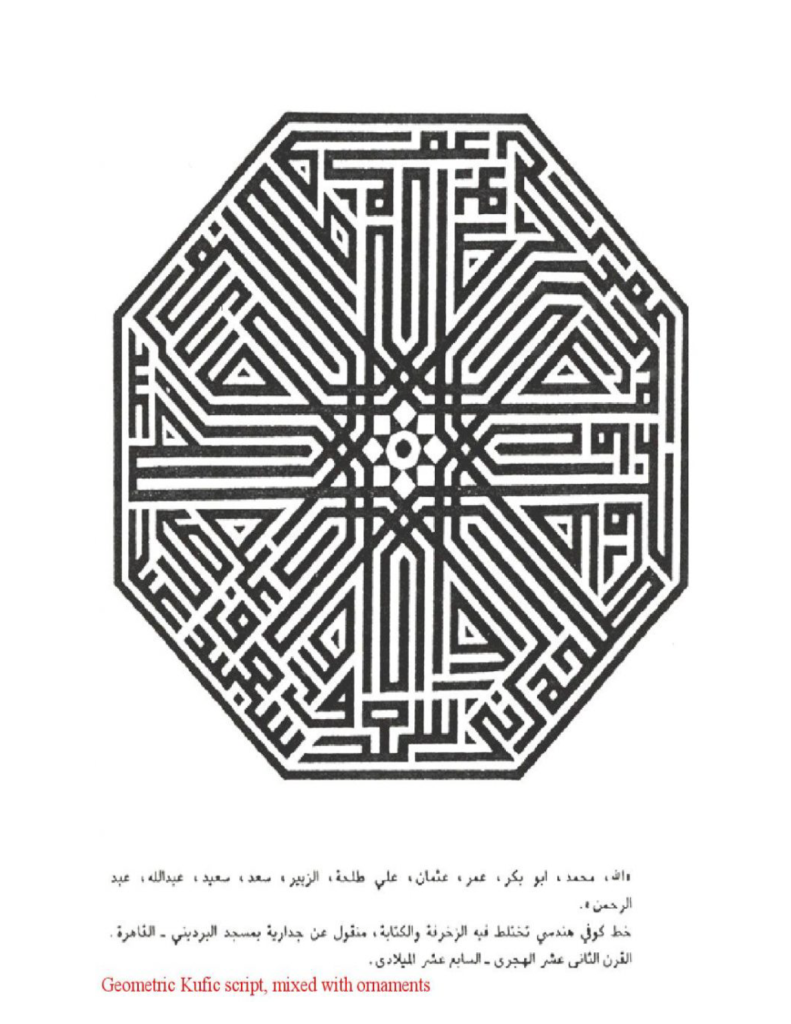
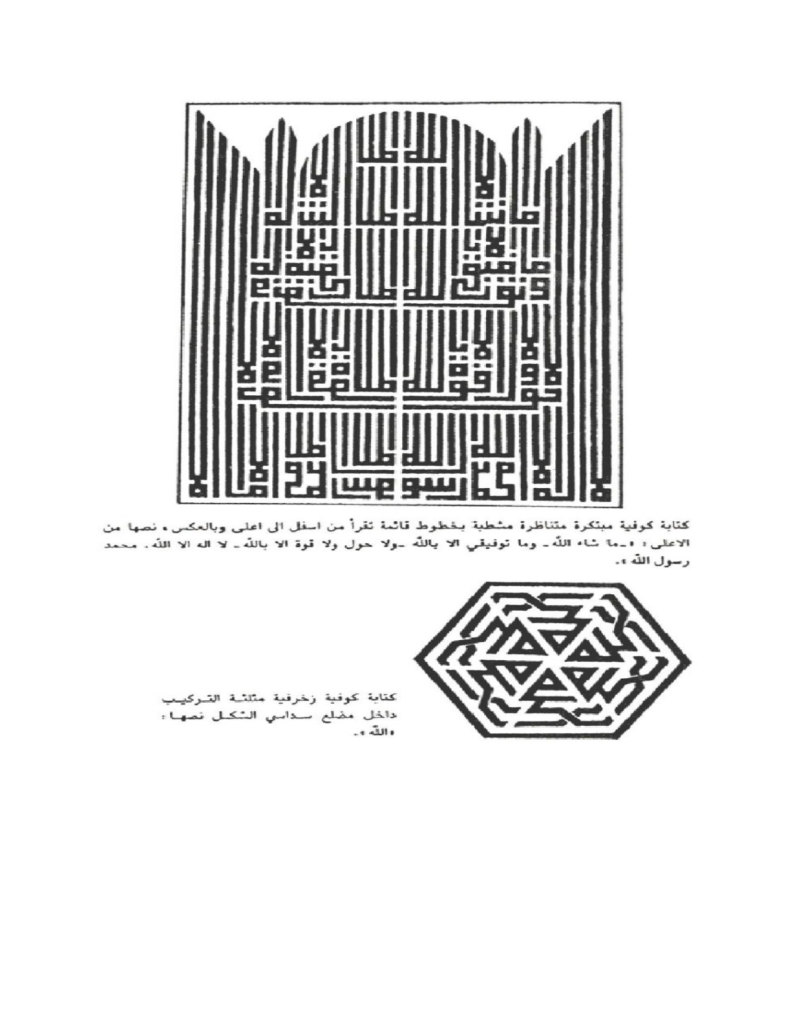

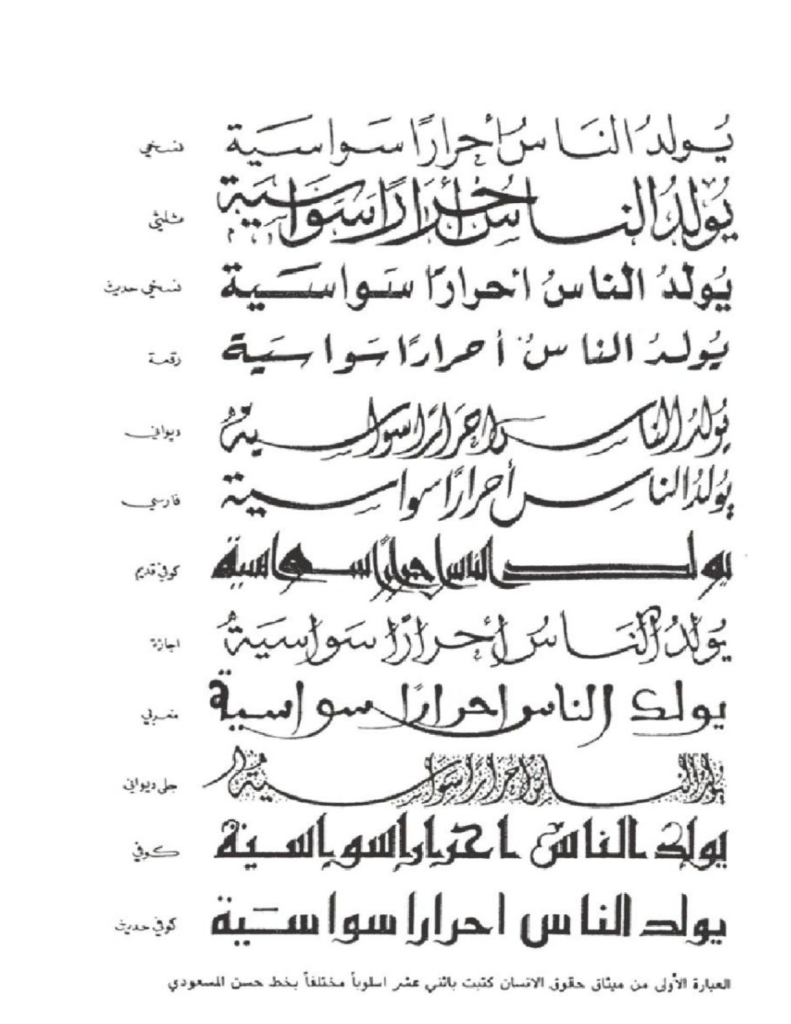
Lesson 3 GRAMMAR NOTE 1.+ أسماء في الجمع من التبعيضيّة ‘partitive min’+ plurals
Followed by a plural noun, which naturally can be modified by adjectives, participles etc., the preposition من signifies ‘one (or a number) of, some of, among’. This prepositional phrase is a high frequency construction used as predicate, usually preceding its subject, which you have encountered and which occurs in this and previous lessons. Here are some of its properties:
1. When the noun that follows the preposition is a non-concrete countable noun, the subject is usually a verbal noun or a nominalized clause (مصدر صريح او مؤوّل) . Thus,
من اسباب تسمية عصر ما قبل الاسلام بـ«عصر الجاهِلِيَّة» انّ معظم العرب كانوا لايؤمنون بالله
Among the reasons for calling the pre-Islamic era ‘the era of ignorance’ is that most Arabs did not believe in God.
من اسباب ذلك رغبة العرب الشديدة في … Among the reasons for this is the Arabs’ strong desire to …
It can also be a repetition of that concrete noun:
من المشاكل التي يواجهها دارسو اللغة العربية مشكلتان اساسيتان
Among the problems that students of Arabic face are two basic problems.
However, when the subject is a concrete noun, the noun after the preposition must be concrete:
من الكتب التي نقرأها كتاب “الأيام” لطه حسين One of the books that we read is ‘Al-Ayyaam’ by Taha Hussein.
من أشهر هؤلاء الشعراء «أُمْرُؤ القَيْس» و… ِAmong the most famous of these poets is…
2. The subject may also precede the predicate, unless it is indefinite (as in the third example above) or is a مصدر مؤوّل as in the first example as in:
من اسباب ذلك . رغبة العرب الشديدة في … The Arabs’ desire to …is among the reasons.
كتاب “الأيام” لطه حسين من الكتب التي نقرأها One of the books that we read is ‘Al-Ayyaam’ by Taha Hussein.
3. We can quantify the items that follow the preposition, using the following constructions:
سبب من الأسباب/واحد من الأسباب/أحد الأسباب ‘one of the reasons’
سببان من الأسباب / إثنان من الأسباب ‘two of the reasons’
ثلاثة من الأسباب/الأسباب الثلاثة ‘three of the reasons/the reasons’
كلّ/ بعض الأسباب ‘all/ some of the reasons
4. A related construction is ممّا where ما is the indefinite relative pronoun (see lesson 5 lexical note 5)
ممّا يجب ذكره أنّ الطالب العربي يواجه … Among the things that should be mentioned is the fact that the Arab student faces …
2. المَصْدَرُ/The Verbal Noun
As you know, the verbal noun/المَصْدر is a noun that is derived from a verb; it is an abstraction naming the action, quality, or state of existence denoted by the source verb. It possesses the properties of the verb it is derived from, such as being intransitive, transitive with one or more objects, requiring specific prepositions before their objects or predicates, etc. It is equivalent to English infinitives (e.g. “to use, to denote, to read”) or gerunds (e.g. “understanding, delivering, reading, using”).
As the مصدر /verbal noun is an abstract statement of the meaning of the verb it is derived from, it normally takes the definite article, as in the following illustration:
قلّ الاتّصال. Making contact is now rare.
A transitive verbal noun requiring a prepositional phrase for its object will also take the definite article:
رغبة العرب في المحافظة على تراثهم. the Arabs’ desire to preserve their heritage
When indefinite the verbal noun implies “some kind of, any kind of…” and often appears in adverbial prepositional phrases of manner:
لم يَلْقَ قبولًا. It did not gain acceptance.
يظهر هذا الخلافُ بوضوحٍ… This difference clearly appears...
Many examples of مَصادِرُ occur in this lesson. In what follows we will briefly review the verbal noun phrase and its functions in the sentence.
a) Verbal noun phrases. As in the case of the English gerund, the verbal noun is often used alone but is also often followed by a subject (that is, a topic or an agent) or an object or both, as in
القراءة مُلْهِيَةٌ Reading is fun The verbal noun stands alone as clause subject and is nominative.
قراءةُ رسائِلِك ملهيةٌ Reading your mail is fun. The verbal noun takes an object as the second term of an idafa, رَسائِلِك, which is in the genitive case.
ليست قراءةُ زيدٍ رسائلَك بملهيةٍ Zaid’s reading your mail is not fun. The verbal noun has an agent in the genitive case, زيدٍ, and an object in the accusative, رسائلَك.
To summarize, the verbal noun will have the case required by its function in the clause such as subject or object in the following sentences; the verbal noun itself may be followed by one noun which is in the genitive whether it is the subject or the object of the verbal noun; and a transitive verbal noun may take an agent in the genitive and also an object in the accusative or a prepositional object in the genitive. Further illustrations:
يسود اليوم استعمال الناسِ العامّيّةَ. People’s use of the colloquial is predominant today.
عند دخولِهٍ المدرسةَ .on his entering school
دُهِشت من فوزِ فريقِنا بالجائزة.ِ I was surprised at our team’s winning the prize.
The verbal noun of a transitive verbal noun may have active or passive meaning, and its مضاف اليه will be either agent or patient (receiver of the action), as in قتلُ زَيدٍ Zaid’s killing (s.o.) or Zaid’s being killed.
Further, a verbal noun from a linking verb may be followed by a topic/subject in the genitive and an accusative predicate:
وذلك لكون العامّيّةِ في الأساس لغةً محكيّةً .That is basically because of the colloquial’s being a spoken language.
b) In addition to the usual functions of any noun phrase in the clause, such as subject or object of a verb, object of preposition, etc., there are some functions specific to verbal nouns, such as the مَفعول مُطـْلَـَق/cognate accusative, تَمْييز/accusative of specification and مفعول لأجْلِهِ/accusative of purpose or cause, as well as the حال/circumstantial construction. These topics have already been or will be dealt with in separate notes.
3. Nominalized Clauses. In most instances the verbal noun/مصدر is interchangeable with a nominalized clause (See…), after nominalizers such as أنَّ plus indicative that and أنْ plus subjunctive that (See…), and ما المصدرية /nominalizing ما (See…). Compare:
I will send him his books:
عند دخولِهِ المدرسةَ on his entering school and
عندما يدخلُ المدرسةَ when he enters school
وذلك: لكون العامّيّةِ لغة ً مَحكيّةً = لأنّ العامّيّةَ لغةٌ محكيةٌ
That is so: because of the colloquial’s being a spoken language
= because the colloquial is a spoken language.
Unlike English that-clauses, these أنْ– and أنّ–clauses can occur even after expressions of desiring, necessity, etc., as in
من المُمكِن أنْ تُقرأَ = من الممكن قراءتـُه It is possible to read it, it can be read.
يحاول استعمالَ الفصحى = يحاول أنْ يستعملَ الفصحى He tries to use Modern Standard
GRAMMAR 3 افعال المقاربة ‘Verbs meaning ‘about to, almost’
In Lesson 1 we took up the auxiliary verb عاد/لم يعد and in lesson 2 the auxiliary verb كان . In this lesson we meet another subclass of auxiliaries, افعال المقاربة ‘the verbs of ‘to be about to/on the verge of’(to do/doing s.th.), also called “verbs of appropinquation”. Two of these are of common occurrence كاد يكاد and أوشك يوشك and here are their major properties:
1. Unlike most other auxiliaries (but like كان) they can appear in either tense, and may be followed by an imperfect indicative verb or by أنْ and a verb in the subjunctive. It is more common for كاد to be used without ان and for أوشك to be used with it.
يكاد الحزن ينفرجُ Sorrow is about to be dispelled.
اوشك الليلُ ان ينتهِيَ The night is almost over.
اوشك ان ينتهيَ الليلُ The night is/was almost over.
الليل يوشكُ ان ينتهيَ The night is almost over.
2. We encounter those auxiliaries in two constructions:
a. The auxiliary is followed by its subject then its predicate (with or without ان ). Here, like كان, the auxiliary is in the singular, and the verb in the predicate must agree with the subject of the auxiliary. It is also possible for the subject to occur in first position, in which case both the auxiliary (like all verbs) and the verb in the predicate agree with the subject.
اوشك الليلُ ان ينتهِيَ The night is almost over.
الليل يكاد ان ينتهيَ The night is almost over.
القرّاء اوشكوا ان لا يستعملوا هذه الحركات The Arab reader hardly ever uses (almost does not use these vowels.
الفصحى تكاد تكون واحدة Modern Standard Arabic is almost uniform.
كاد المعلّم ان يكون رسولا A teacher is close to being a prophet.
b. The auxiliary is followed directly by ان and a verb in the subjunctive and is in the singular. As mentioned above, كاد is more likely to occur without ان than أوشك is.
الناس هناك يكادون ان يموتوا جوعاً People there are about to die of hunger.
c. Unlike كان , neither auxiliary can occur in the imperative.
d. The مصدر مؤوّل cannot be turned into مصدر صريح, without further modification.
5. Particular properties of each auxiliary:
a. كاد يكاد (ان)
The following observations apply to كاد يكاد but rarely if ever to أوشك يوشك :
(i) كاد، يكاد may be negated with/ لم ، لا ما , respectively, or they may have their predicate in the indicative negated by لاا :
كادت الطائرة ان لا تغادر المطار بسبب الأمطار The plane was about not to depart from the airport because of rain.
(ii) A construction of common usage is a sentence with a negative form of كاد followed by a sentence headed by the conjunction حَتّى
ما كاد ينهي خطابه حتّى حَيـَّوْه بهتاف عاصف. No sooner did he finish his speech than he was greeted with wild applause.
(iii) كاد can be used elliptically after a sentence. Such usage is rare in Arabic, which in this situation typically would require a repetition of the predicate. Here is an example, taken from the Basic Text:
وقد انتشر هذا الاسلوب عند الجميع او كاد This style is widely spread among all or about to be.
Cf
لا أعرفه انا ولا يعرفه أحد I do not know him and neither does anyone else.
b. أوشك، يوشك
(i) أوشك but not كاد has an active participle form in use: موشِكٌ .
هم موشكون ان يغادروا البلاد نهائيّا They are about to leave the country definitively.
(ii) أوشك but not كاد can be followed by the preposition على . In this case it can take a مصدر whether صريح ‘verbal noun’ or مؤوّل ‘أنْ clause’:
أوشكا على الانتحار/انْ ينتحرا The two of them were about to commit suicide.
(iii) It but not كاد has a Form I verbal noun وَشْك which is used in the phrase على وشْكِ followed by a مصدر whether صريح ‘verbal noun or مؤوّل ‘أنْ clause’ to mean ‘on the point of, on the verge of’:
كان الضيف على وشكِ الرَحيل/انْ يرحَل The guest was on the verge of departing.
Note: (ii) and (iii) are the only cases of auxiliaries other than التامّة كان where we can use both مصدر صريح ‘verbal noun’ or مؤوّل ‘أنْ clause’.
(iv) Finally, أوشك but not كاد has an adjectival Form I form in useوَشيكٌ ‘forthcoming, impending’, mostly used as نعت سببي ‘adjectivalإضافة (see Lesson 7 Grammar Note 1):
الحرب هناك وشيكة الوقوع War there is imminent .
1. أما . ف ‘as for’.
When you want to highlight a word or a phrase in a sentence you can us this construction: place the noun to be highlighted after أمّا ‘as for’ with the noun in the nominative case, and then put the rest of the sentence after فَ. To illustrate with the sentence
كان الحضرُ يعيشون في المدنَ ‘The sedentary people lived in cities.’
If you want to highlight الحضرُ ‘the sedentary population’ in contrast with البدْوُ ‘the nomads, the Bedouin’, you remove الحضرُ from within the sentence and place it after أما in the nominative case: أما الحضرand place فَ at the beginning of the basic sentence without its highlighted word:
أما الحضر فكانوا يعيشون في المدن
Finally, the highlighted word after اما must be tied to the sentence after فَ : if the word that was removed was the subject of the verb, then the verb must be made to agree with the highlighted word, thus:
أما الحضر فكانوا يعيشون في المدن ‘As for the Bedouin, they inhabited the cities’ where the verb was changed from masculine singular in the original to masculine plural in the final sentence.
If the highlighted word was not the subject of the verb, then a pronoun that agrees with it must be inserted to fill its place:
عاش عند البدو سنتين ‘He lived with the Bedouins two years.’
اما البدو فعاش عندهم سنتين ‘As for the Bedouins, he lived with them for two years.’
The topic can be several things besides a noun: it can be a prepositional phrase, a noun clause (“an أن-clause”), etc.:
اما بالنسبة الى المناخ فالجو صافٍ ودرجة الحرارة معتدلة ‘As for in respect to the weather, the sky is clear and the temperature is moderate.’
اما انْ يقولَ ذلك فهذا مستَحيلٌ ‘As for him to say that/his saying that, that’s impossible.’
This kind of sentence is called a Topic – Comment sentence: اما introduces the topic and فَ provides commentary about it. A common variant is to retain the same structure but omit اما…فَ giving these versions of the two sentences above:
الحضر كانوا يعيشون في المدن ‘The sedentary, they lived in the cities’ = ‘The sedentary lived in the cities.’
البدو عاش عندهم سنتين ‘the Bedouins, he lived with them two years.’ = ‘he lived with the Bedouins two years.’`
In English we say “This one I want; that one I don’t.’ In Arabic we would say “This one I want it; that one I do not want it.’
3. من … أنْ / أن
1.1 You are quite familiar by now with the following sentences from this and other lessons and are aware of the pattern here: a predicate (underscored), which in each sentence precedes المُبتدأ .
من اسباب تسميته بـ«عصر الجاهِلِيَّة» ان معظم العرب كانوا لايؤمنون بالله
من المشاكل التي يواجهها دارسو اللغة العربية مشكلتان اساسيتان
من العادات العربية ان يخضع جميع افراد الاسرة للوالد
من التقاليد الامريكية ان تجتمع العائلة في يوم الشكر
من أهم أَحْداثِ القرن التاسع عشر انتشار الامبريالية
من اغراض هذا الكتاب تعليم العربية للأجانب
This construction with various variations is very widely used in Arabic today: here the predicate is a prepositional phrase consisting of the preposition مِن followed by countable nouns in the plural. Other types of words can occur as nominals, after من . These include:
1.2 adjectives:
من الجدير بالذكر ان التعليم في معظم المدارس حكومي تشرف عليه وزارات التربية والتعليم
It is worth mentioning that education in most schools is public, controlled by Departments of Education.
من الضروري جداً تَشْجيعُ الطلبة على دراسة اللغات الاجنبيّة
It is necessary to encourage students to study foreign languages.
من السهل على طلاب العربية الجدد ان يخلطوا بين شَكْلَي الفاء والغين في وسط الكلمة.
It is very easy for new students of Arabic to confuse الفاء والغين
من الصعب عليه الآن ان يَصْعَدَ إلى رأس الجبل لأنه في السبعين من عمره.
It is difficult for him to climb to the top of the mountain because he is in his seventies.
1.3 Active Participles
مِنَ المُمْكِن التنقل بين اوروبا وامريكا في ساعات قليلة
It is possible to travel between Europe and America in just a few hours
من الظاهر أنّ مبدأ «الحقُّ للقويّ» أو كما يقال بالانجليزية «القُوَّةُ هي الحَقُّ» هو المبدأ السائد بين الأمم والأفراد.
It looks like the principle that right reside with the powerful, or as is said n English “might s right”a, is prevalent among nations and individuals.
1.4 passive participles اسم المفعول
من المعروف ان الاوروبيين قدِ اقْتَبَسوا الأرقام العربية عن العرب
It is well known that Europeans have borrowed the Arabic numerals.
من المعتقَد ان قيام دول مختلفة في حدود معيّنة من اهم التطورات التي شهدها العالم منذ بدء التاريخ.
It is believed that the rise of nations with well defined boundaries is one of the most developments which the world has witnesses since the dawn o History.
1.5 elatives
من اهمّ نتائج هذا الامتداد ان الفصحى اصبحت لغة علم وفنّ وبحث وفلسفة
The most important result of this expansion is that Classical Arabic became a language of Science, Arts, and Philsophy.
من أصعب الأمور ان نحدد أركان أي قومية بدقة
It is most difficult to define the basic elements of nationality with any precision.
المضارع المرفوع ‘The Imperfect Tense’
The Imperfect Tense in the indicative mood (المضارع المرفوع) has, as you know, a number of possible translations in Arabic. This text has several uses of the imperfect tense verb as a main verb:
- habitual action, something that is done repeatedly or customarily:
وكان من أولئك الذين يخلطون بين القلب والمعدة ‘He was one of those who [typically] confuse their heart with their stomach.’
يوضَعُ، يُغَطّى، تُحَمَّرُ، يُضافُ إلَيْهِ ‘[whenever this dish is prepared] it is placed…, it is covered, it is browned, [there] is added to it’
- generic action, an action that is predictable for a class of individuals or objects and serves
to characterize that class, as in “Dogs bark at cars” and “Winds blow from west to east.” Proverbs often have verbs with generic sense, as in “Love conquers all” and “A stitch in time saves nine.” The following verb is generic in function:
الاذن تعشق قبل العين احياناً .‘The ear sometimes falls passionately in love before the eye does.’
- Stative verbs are verbs that denote a state, condition or quality, like “to want, to need, to matter”; they denote a lack of any activity and are sometimes called “actionless verbs”. Basically they denote existence plus some additional layer of meaning; for example, “to have” means “to exist in possession of” and “to like” means “to exist with a liking for”. A feature of stative verbs is that, since they do not denote actions, they are not put in the progressive construct: you can say “I have fifty dollars on me” but not “I am having fifty dollars on me.” If a stative verb is used in the progressive it takes on a different meaning: “I am having a good time” = “I am enjoying myself”, an activity. Some stative verbs can be transitive, like “to have, to know” and can be used in the imperative form.
Curiously, “to want” cannot occur in the present progressive (“I am wanting to see that movie”) but does occur in the past progressive: “I was wanting to ask you this question:…” In this case the progressive takes on the meaning of volition—desire, intent.
The following stative verbs occur in the Text:
هل تعرفها؟‘Do you know her?’ اعرف ‘I know’
تريدان تملكَ قلبَه .‘she wants to possess his heart.’
It is important to repeat that stative verbs never denote actions; the perfect tense, however, only denotes events (except, of course for كان): something happened. So what happens when a stative verb is put in the perfect tense? Tense trumps stativity: the stative verb in the perfect tense denotes the action of entering the state or quality denoted by the verb–a change of state. Thus, the stative verb يَحْسُنُ in the imperfect means “is good”, but the perfect حَسَنَ has the meaning “entered the state of goodness” = “became good”. “It was good”, of course, is expressed with كان: كان حسناً. Likewise, يَعْرِفُ means ‘he knows’ but the perfect عَرَفَ means “he came to know, learned, found out”. So, remember: a stative verb in the perfect means “to acquire the quality or condition depicted by the verb”.
- future. In a context referring to a subsequent situation the imperfect verb may predict afuture action or state; in the following citation the verbs are in questions about future action:
هل يضحك؟ هل يبكي؟ ‘Shall he laugh? Shall he cry?’
Usually the prefix –سَ or the word سَوفَ precedes the imperfect verb to predict future action or state:
ستُسْعِدُني ‘she will make me happy, she is going to make me happy’
- progressive: an action in progress, a continuing action, as in
ماذا تفعلُ، يا زيد؟ ‘What are you doing, Zaid? and خليل ينتظر اخاه احمد ‘Khalil is waiting for his brother Ahmad.’
- dispositional: disposed to or capable of doing the action: تتكلم العربية والكردية ‘She
speaks Arabic and Kurdish.’
- narration: reporting an action as it takes place, or narrating the events in a story. In this latter function it is equal to the perfect tense. This is often called “the historical present’.
The meaning of a particular verb in the imperfect tense will depend on, first, its semantic class and then the context in which it is found.
1. سواء
How do we express ‘whether … or …, no matter whether …, regardless of whether …’
1. One of the ways is illustrated in the New Vocabulary section and in the Basic Text and involves the use of سواء.
a. With equational sentences (i) it is very common to use the appropriate form of كان after سواء , followed by the same disjunctive conjunction أو or أم , which in turn is followed by the alternatives, as in the following examples:
… الأكلات … سواء كانت لبنانيّة أم/أو اردنية …the food, whether Lebanese or Jordanian.
الفصحى واحدة … سواء كان ذلك في العراق أم في مصر…
Al-Fus-ha is one, whether (lit. it is) in Iraq or Egypt.
(ii) The use of كان is optional and can be deleted if its subject has a referent in, as in the first example above), or is a referent to (as in the second example), the sentence that precedes it. Thus, it can be deleted in the two sentences above and in the following sentence in the Basic Text:
…شكل واحد لكل حرف سواء (كان) في اول الكلمة او …
… one form for every letter, whether at the beginning of the word or …
but not in: .
اذهب الى المحاضرة سواء كنتُ في العراق أم في مصر
Go to the lecture whether I am in Iraq or Egypt.
b. With verbal sentences, سواء is followed by the verb, most often in the perfect:
سيبقى صديقاً عزيزا سواء بقي هنا ام غادر البلاد He will remain a good friend whether he stays or leaves the country.
c. The second alternative in either sentence type can be the negative of the first or its antithesis:
سواء في العراق أم في غير العراق … whether in Iraq or in places other than Iraq
… سواء كانوا مصريين ام لم يكونوا …, whether they be Egyptians or not
لن نغادر سواء هدأت الأوضاع ام لم تهدأ We won’t leave whether things are quiet or not.
سنرضي بها سواء شئنا ام أبينا We will accept it, whether we like it or not.
d. The expression with سواء may precede the main clause, which is then introduced by ف or فإنّ :
سواء هدأت الأوضاع ام لم تهدأ فأننا لن نذهب whether things are quiet or not we won’t go.
e. In Modern Standard Arabic, سواءً is most commonly used in the accusative. In Classical Arabic, سواء is followed by the interrogative particle أ in which case the whole sentence is considered the subject and سواء as predicate is put in the nominative. Thus, in the Qur’an we have the statement:
سواءٌ عندهم أأنذرتهم أم لم ننذِرْهم It is the same for them, whether you warn them or not.
2. The other way to express ‘whether … or not’ obviates the need for the use of سواء by (i) putting the conjunction between two verbs, usually in the perfect, with one often the antithesis of the other, as in
سنرضي بالأوضاع شئنا ام أبينا We will accept the situation, whether we like it or not.
لن استفيد منه قلّ ام كثر I will not benefit from it whether it be little or much.
or (ii) by putting كان between predicates in the accusative:
يستخدمها الجميع مثـَقـَفـين كانوا ام غيرَ مثـَقـَفـين All use it, educated or non-educated.
Lesson 3 Lexical 7 P الخ اينما، حيثما، كلَّما
A number of conjunctions occurring in this lesson and other lessons and consisting of a question word, an adverbial, or a noun with an attached ما are of common occurrence in Arabic, most with an implied conditional meaning. Here are some comments:
1. اينما، حيثما ‘wherever’
These words, which are usually followed by the perfect, may follow the main clause or precede it.
تستطيعون ان تذهبوا ايـ(نما) شئتم وحيث(ما) وجدتم عملاً
You can go wherever you want and wherever you find work.
اينما اتّجهت وجدت أمامي عقبات Wherever I go I find obstacles.
As seen in these examples, following the main clause, both words can be used without ما
When preceding the main clause اينما، حيثما، may also be followed by the jussive, in which case the verb in the main clause is perfect or jussive. Modern usage seems to rarely follow this practice.
Others words like اينما، حيثما، are: كيفما ‘however, howsoever, be that as it may’ and
أيّما ‘whatsoever, whatever’ (for this last see the note on أيّ ).
2. كلـَّما ‘whenever’
In many ways, كلـَّما behaves like اينما، حيثما in being followed by the perfect and in preceeding or following the main clause. However, in examples like the following,
كلّما تذكّرت هذه الحادثة شعرت بألم شديد في رأسي
Whenever I remember this incident, I feel great pain in my head.
يظهر هذا الاختلاف كلّما قلّ الاتّصال This difference appears whenever communication decreases.
(i) it cannot be used without ما with the meaning of ‘whenever’, and is not followed by the jussive,
(ii) it may be used in consecutive clauses with the meaning of ‘the more … the more’:
كلّما انتظرنا (كلّما) ساءت الأوضاع The more we wait, the more conditions will worsen.
كلـَّما must be clearly distinguished from كلّ ما ‘all what’ where كلّ behaves like a noun:
هذا كلُّ ما عندي This is all I have.
أعطيته كلَّ ما طلب I gave him all he asked for.
يتدخّل في كلِّ ما لا يعنيه He interferes in everything that does not concern him.v
3. بينما ‘while’
It indicates that the two clauses it joins take place simultaneously. It may precede or follow the main clause, and is followed by a verbal or nominal clause with the verb in the perfect or imperfect.
بينما كنت أقرأ إذْ بصوت مزعج يدوي While I was reading, a disturbing voice resounded.
Like English, بينما ‘while’ is also used with the meaning of ‘whereas’.
to contrast two statements
تستخدم الفصحى في الكتابة بينما تستخدم العامّية في الاتصال اليومى
Fus-ha is used in written materials, whereas colloquial is used in daily communication.
Other conjunctions like بينما are حينما ‘while, when, as’ and متى ما ‘whenever’
Lesson 3 LEXICAL 2 وإن ‘even though, although, even if’
You are familiar with the particle إن as a conditional particle. It can have another function when preceded by the conjunction و which in turn can be preceded by the particle حتـّى ; it is followed by a conditional clause الشرط جملة , but without an apodosis جواب الشرط . The construction is concessive: What is meant is that the main clause will be true whether or not the condition is satisfied. The verb after it is perfect and appears as كان in an equational sentence; it usually follows the main clause, though it may sometimes precede it, in which case that clause will take the particle ف .
… لهجات تختلف من بلد الى آخَر حتـّى … (these are) dialects which differ from
وإنْ كان بينها اوجه شبه. country to country, although there are similarities among them.
تلك عهود مضت وإن تركت آثارها. These are eras that have gone, even though they did leave their imprint.
وإن تركت هذه العهود آثارها فإنّها قد ولـّت. Although they left their imprint, these ears have glided away.
Another particle so used with the same meaning is another conditional particle لو . It may be followed by the perfect or by أنّ .
لا يستخدم هذه الحركات عند قراءة الصحف والمجلّات مثلا حتـّى ولو احتاج الوضع قراءة ً جهرية.
He does not use these vowels when reading … even if the situation needs reading them aloud.
استخدم العربية حتّي ولو أنّ ذلك سيسبّب لك حرجاً.Use Arabic even though this might cause you some embarrassment.
قم بالواجب حتّى ولو انّ ذلك من المستحيلات. Do your duty, even though it may be an impossibility.
ولو can be followed by a predicate of an equational sentence without the need for كان
انتظرني ولو قليلاً. Wait for me, if only for a little while.
جرّبي هذا الدواء ولو مرةً واحدة. Try this medication, even once.
ذهب للمقابلة ولو بتردّد وحذر. He went for the interview, although with hesitation and cautiously.
1. لو
In addition to its use as a conditional particle, لو has other functions:
a. It is used as an optative particle after some verbs indicating desire, wish, and wish, like ودّ وتمنّىّ , for something desired but unattainable.
It is followed by a perfect or imperfect verb and may be followed by a clause with أنّ .
اتمنّى لو استطيع ان اقضي وقتاً اطولَ مع العائلة. I wish I could spend longer time with the family.
كنت اتمنّى لو استعرضنا جهودك في كل ميدان. I would wish to cover your endeavors in every field.
تُفضّل لو انّه يذهب الى القاهرة بدلاً من روما . She would prefer that he go to Cairo rather than Rome.
This clause with لو can sometimes occur independently as an exclamation and as a sign of yearning for something: ‘If only … !’
لو كنتُ في مكانِك! آهِ لو كنتُ في مكانِك If only I could be in your place! If only!
لو يعلم! If he only knew!
b. لو , and إنْ as well, are used to introduce concessive clauses to mean ‘even though, even if’. They are often preceded by the conjunction و and حتّى
as حتّى ولو ، حتّى وإن . (This و is not used when حتّى is preceded by و (. They are followed by verbs, mostly in the perfect. لو may be followed by a clause with أنّ :
يعبدون إلهاً واحداً وإن اختلفت أساليب العبادة. They worship one God, every though worship rites differ.
يجب ان يمكثوا في الخارج سنتين حتّى وان تزوّجوا من امريكيات.
They have to live abroad for two years, even if they married Americans
الموت واحد حتى ولو كانت أسبابه مختلفة. Death is death even if its causes are many.
The clause with the particle often follows the main clause, but it may precede it, or occur parenthetically. The main clause in this case is preceded by ف or فإنّ
حتى وإن كانت الأقلّيّات قليلة العدد فإنّها تتمتّع بحرّيّاتها كاملةً .
هذه الأقلّيّات – حتى وإن كانت قليلة العدد – فإنّها تتمتّع بحرّيّاتها كاملةً
Even though these minorities are small in number, yet they enjoy their freedoms fully.
An elliptical construction, implying the verb كان is often used with لو ; in this case, it must follow the main clause :
يقضي وقتاً معنا ولو قصيراً. He does spend time albeit short.
تصدّر زيتها ولو بكمّيّات محدودة. It exports its oil, albeit in small quantities.
انتظرني ولو لبرهة قصيرة. Wait for me, if only for a short while.
c. The clause with لو is sometimes preceded by كما to mean ‘as if, as though’:
تتصرف وهي معه كما لو كان زوجَها While with him, she behaves as if he were her husband.
d. It also follows فيما to mean ‘in case that, just in case’, and may precede or follow the main clause:
فيما لو قابلته بلِّغْه سلامي In case you meet him, say hello to him.
سأزور المدرسة فيما لو كنت في بيروت I will visit the school in case I am in Beirut.
